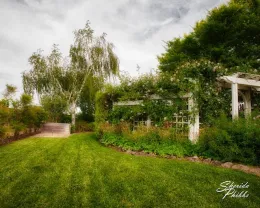
OVERWATERING - This is the most common mistake! Most of us have been guilty of this at some time. Once the plant has established a good root system, only water when the plant needs it. Plants do not like to have their feet standing in water. It will lead to poor health of the plant and decrease the yields of some vegetables. Too much or too little soil moisture damages or kills plants and favors many pest problems.
When to water? It depends of several conditions: What is your soil like? If it is clay, then it holds moisture longer than a sandy loam soil. How is the climate? If it is hot or windy, both of which are drying so you will want to water more frequently. Know the water requirement of your plants. The best tip I can give is to watch your plant, feel the moisture of the soil by inserting your finger into the soil a couple of inches to see at what point you feel moisture. I water when the top 2 inches of the soil is dry. Read more about water management.
SHALLOW WATERING - Some gardeners enjoy hand watering with a garden hose. Typically what happens with shallow watering is the plant and lawn just get a shower. However, most of the time the roots are getting very little water. All plants benefit with deep watering which encourages their roots to reach down. Lawns do better with infrequent deep watering. Plants become dependent on frequent watering which can result in toppling over and they will quickly wilt because their roots haven't grown deep. By watering deeply and infrequently you will have healthier, happier plants and you will also conserve water. Learn more about irrigation of trees and shrubs.
NOT SELECTING THE RIGHT PLANT FOR THE RIGHT PLACE - Knowing the plant's requirements: climate zone, their sun requirements, pH requirement for the plant, your climate zone, microclimates in your garden and landscape, as well as the mature size of the plant are always the first steps in selecting a plant. Find out your planting zone for Humboldt and Del Norte on our website .
NOT PREPARING THE PLANTING BEDS - Incorporate compost into the soil by double digging the bed. Compost enriches the soil and helps to maintain moisture. It also encourages the production of beneficial bacteria and fungi that break down organic matter to create humus. Humus is a rich nutrient-filled material. This will allows for good root run. Check the pH levels and add necessary amendments a few weeks before planting time. Good soil is important for vegetable gardens. Learn more about composting.
PLANTING OUT OF SEASON - Vegetables are classified as warm or cool season crops. Know your frost dates and watch your current weather. Plant bare roots in the dormant season. Refer to Sunset Zone Cool Season Planting Guide for Humboldt/Del Norte and Sunset Zone Warm Season Planting Guide for Humboldt/Del Norte.
IMPROPER AND/OR NOT PRUNING YOUR SHRUBS AND TREES - This seasonal task is hard work but the payoff is huge. Left unpruned, shrubs and trees grown for ornamental purposes loose their structure and shape. Fruit trees and berry bushes require pruning for health and fruit yields. Left unpruned, suckers and unnecessary branches take up energy that should have been directed towards the flowering and setting of fruit. Some fruits only growth on new growth. Know the correct timing and correct pruning techniques. Learn about pruning.
PLANTING INVASIVE PLANTS - Once established it is hard and sometimes impossible to remove invasive plants. Become familiar with what plants are invasive to your area. For more information on invasive plants visit PlantRight.
USING PESTICIDES UNWISELY - Learn to have tolerance for some insects. Not all insects are bad. Many times insects can be managed with proper cultural care, hand picking or washing off with water from your garden hose. Identify the insect before reaching for the chemicals. Read UC IPM's information on using pesticides wisely.
NOT USING MULCH - Using organic mulch offers advantages to our gardens: Improves soil quality/fertility, reduces weeds, helps soil to retain moisture, helps with equalizing soil temperature. Additional information on types, using and how much mulch can be found on UC IPM's website.
IMPROPER SELECTION AND PLANTING SHRUBS AND TREES -Selecting the right plant and proper tree planting will help to insure a young tree's survival. Pick the right time and don't plant too deeply. Read more about proper planting here.

